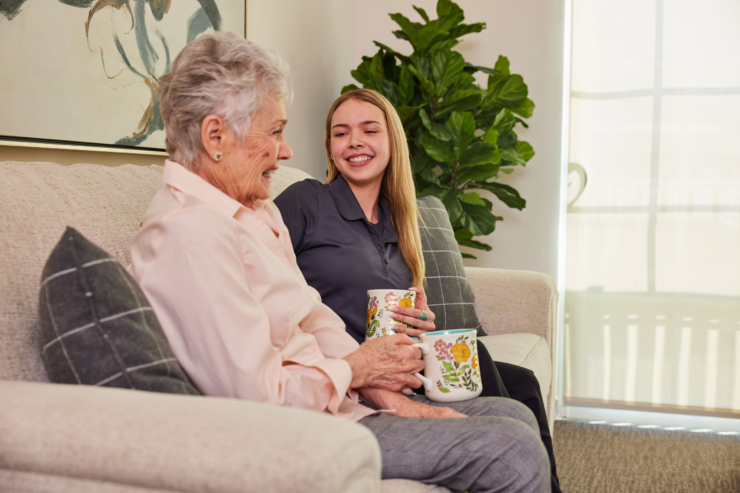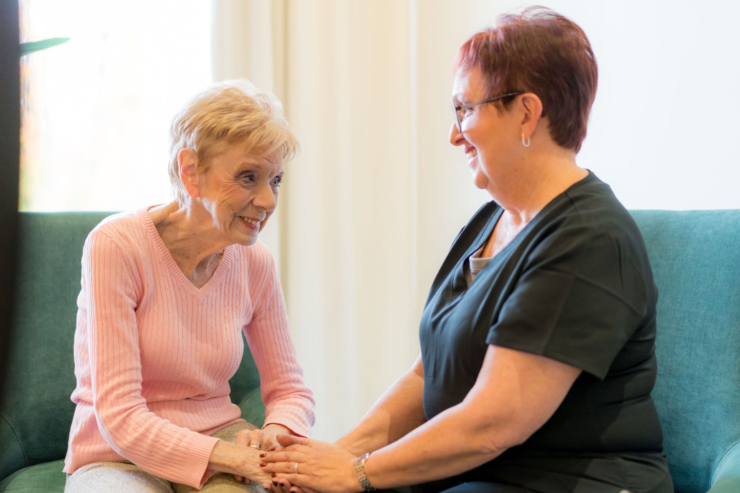
What are the benefits of music programs for seniors with Dementia?
Dementia affects more than 55 million people worldwide, according to the World Health Organization, and is more common as people age. Dementia is not one single disease, but an overall term that covers a wide range of conditions like Alzheimer’s disease, Frontotemporal dementia, Lewy body dementia, Vascular dementia, and Mixed dementia, a combination of two or more types of dementia. Dementia causes those affected to lose cognitive abilities such as thinking, remembering and reasoning, and may also affect emotions. It can be challenging to watch your loved ones experience a range of feelings, behaviors, and emotional changes, however, there are efforts that can alleviate the symptoms of dementia and help to create positive interactions.
Recent studies have shown that music therapy for the elderly with dementia can have a positive impact on mood, cognition, and emotional interactions. It can also help caregivers by allowing them to make meaningful connections with their loved ones. An example of this is “Musical Bridges to Memory,” a program developed by The Institute for Therapy Through the Arts. In this program, a live ensemble plays familiar tunes from musicals like The Sound of Music or Oklahoma and caregivers and those with dementia dance and sing together and play simple instruments. Music allows for emotional interactions and connections to be made that might not have otherwise been possible.
What is the Connection Between Music and the Elderly Brain of a Person with Dementia?
Music is part of our daily lives from childhood to the teen years and into adulthood. The earliest memories of music may be of lullabies being sung by parents, or learning songs about the alphabet in preschool or elementary school. Those involved in faith communities are surrounded by the songs of their faith from a young age. Teenagers often develop their own musical tastes, dances, and means of expression which are different from those of their parents.
Hearing music from different periods of life can evoke powerful memories and feelings. Those who are seniors now, for example, may hear the rock and roll or swing music of the 50s and 60s and fondly recall dances and parties of their youth. If music has the power to stir strong emotions and memories, could it also have the power to reach those with dementia and impact their ability to remember, process information, and make connections? Science shows us that may be possible!
Why Do Researchers Believe That Music Programs For The Elderly Provide Psychological and Even Physical Benefits?
To understand why researchers believe music programs for the elderly may have the ability to improve cognition and emotional connections and reduce anxiety, it helps to understand which parts of the brain are affected by dementia. The area of the brain called the cerebellum is involved in musical memory and processing, and it is not affected as much as other areas until much later in the progression of the disease. Music memories stay in the brain even after other memories fade, and the ability to speak is reduced. So seniors with dementia may be able to sing every word of a song from their youth or dance every step from a dance they learned over 50 years ago.
Ashmat Nabizad, Community Relations Director of Tribute at the Glen, saw this effect when the residents were treated to a performance of an Elvis impersonator. “Music is a significant benefit to those with Alzheimer’s and dementia. We’ve seen it firsthand when they hear the music and remember the old days, they feel young again,” he said.
What Benefits Do Music Activities Have for Seniors with Dementia?
Because music memories for seniors with dementia are retained longer than other memories, listening to music, singing or combining music and movement for the elderly can have a host of benefits. Certain songs or types of music may take them back to the days of their youth. Hearing country music from the 1960s, for example, might evoke happy memories for some of time spent with friends or family. Music can also reduce anxiety and agitation, not only for the person with dementia, but for the caregivers and the loved ones’ families as well. In fact, a recent study on music therapy found that the participants were less agitated and anxious after the sessions, and were less likely to evoke those emotions in others.
For seniors with dementia who have aphasia, the loss of speech capabilities, music can provide a way for them to make emotional connections with caregivers and loved ones and enhance social engagement with others. Music activities for the elderly may also improve cognition and executive functioning in daily activities. But music-related activities are just some of the activities that may enhance the lives of those living with dementia and their caregivers and loved ones. Activities such as yoga classes for seniors, art, gardening, working on puzzles, and baking also provide for self-expression, sensory and cognitive stimulation, and can foster connections.
The Cogir Family of Communities Provides A Holistic Engagement of the Body, Mind and Spirit: Prioritizing Activities for Seniors with Dementia
Revere℠ Memory Care is a program designed specifically for those living with dementia. At Cogir Senior Living, we use relationship-based methods centered on your loved one’s needs to enrich their mind, body and spirit. You can rest assured knowing that your loved one will receive the highest quality services while engaging their senses each day through music, art, movement, food and more.
In addition to music and dance classes, the Revere℠ Memory Care program includes activities such as Encounters with Nature and Sensory Stimulation which allow residents to enjoy physical activity, fresh air, and sunshine and to experience sensory stimulation such as the scent of flowers. Studies have shown that outdoor activities for seniors with dementia can have a calming effect, and can foster a sense of connection with nature and with others. Mental engagement and self-expression are also important, so activities such as playing games, working on puzzles, baking and creating artwork are also encouraged. These are just some of the programs offered to enrich the lives of your loved ones at The Cogir Family of Communities.
Five senior living communities in the Washington, DC metropolitan area – Tribute at One Loudoun in Ashburn, VA; Tribute at The Glen in Woodbridge, VA; Tribute at Black Hill in Germantown, MD; Tribute at Melford in Bowie, MD; and Cadence Olney in Olney, MD – are part of the Cogir Family of communities. What sets Cogir apart is the company’s devoted approach to creating healthy, vibrant communities that offer residents exceptional independent living, assisted living and memory care lifestyle options. Cogir Senior Living develops, owns and/or operates 60 lifestyle communities throughout the United States. For more information, visit cogirusa.com.
Related News

Memory care costs explained: what you’re really paying for
Paying for memory care can feel overwhelming, but it’s crucial for families seeking the best support…

Looking for memory care? you should ask these questions
Living with dementia can be just as difficult for a caregiver as it is for the affected senior — maybe…

What is memory care and how can it help seniors with Dementia?
Watching a loved one struggle with memory loss can be heart-wrenching. Whether it’s due to Alzheimer…
